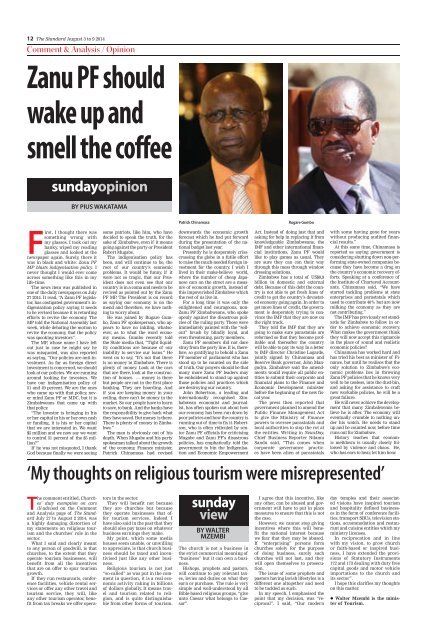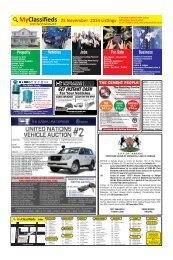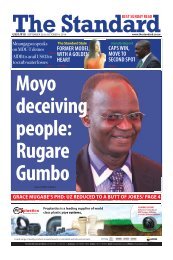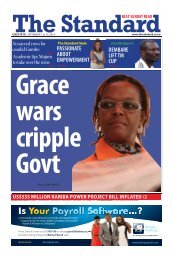Create successful ePaper yourself
Turn your PDF publications into a flip-book with our unique Google optimized e-Paper software.
12 <strong>The</strong> <strong>Standard</strong> August 3 to 9 2014<br />
Comment & Analysis / Opinion<br />
Zanu PF should<br />
wake up and<br />
smell the coffee<br />
sundayopinion<br />
BY PIUS WAKATAMA<br />
Patrick Chinamasa<br />
Rugare Gumbo<br />
First, I thought there was<br />
something wrong with<br />
my glasses. I took out my<br />
hanky, wiped my reading<br />
glasses and looked at the<br />
newspaper again. Surely, there it<br />
was in black and white: Zanu PF<br />
MP blasts indigenisation policy. I<br />
never thought I would ever come<br />
across something like this in my<br />
life-time.<br />
<strong>The</strong> news item was published in<br />
one of the daily newspapers on July<br />
27 2014. It read, “A Zanu PF legislator,<br />
has castigated government’s indigenisation<br />
policy saying it needs<br />
to be revised because it is retarding<br />
efforts to revive the economy. <strong>The</strong><br />
MP told the National Assembly last<br />
week, while debating the motion to<br />
revive the economy, that the policy<br />
was spooking investors”.<br />
<strong>The</strong> MP, whose name I have left<br />
out just in case he might say he<br />
was misquoted, was also reported<br />
as saying, “Our policies are anti-investment.<br />
As far as foreign direct<br />
investment is concerned, we should<br />
look at our policies. We are running<br />
around looking for investors. We<br />
have our indigenisation policy of<br />
51 and 49 percent. We are the ones<br />
who came up with that policy, never<br />
mind Zanu PF or MDC, but it is<br />
Zimbabweans that came up with<br />
that policy.<br />
“<strong>The</strong> investor is bringing in his<br />
or her capital in his or her own cash<br />
or funding, it is his or her capital<br />
that we are interested in. We want<br />
$5 million and we now say we want<br />
to control 51 percent of the $5 million?”<br />
If he was not misquoted, I thank<br />
God because finally we were seeing<br />
some patriots, like him, who have<br />
decided to speak the truth, for the<br />
sake of Zimbabwe, even if it means<br />
going against the party or President<br />
Robert Mugabe.<br />
<strong>The</strong> indigenisation policy has<br />
been, and will continue to be, the<br />
root of our country’s economic<br />
problems. It would be funny, if it<br />
were not so tragic, that our President<br />
does not even see that our<br />
country is in a coma and needs to be<br />
revived as pointed out by the Zanu<br />
PF MP. <strong>The</strong> President is on record<br />
as saying our economy is on the<br />
mend and therefore, we have nothing<br />
to worry about.<br />
He was joined by Rugare Gumbo,<br />
Zanu PF spokesperson, who appears<br />
to have no inkling, whatsoever,<br />
as to what the word economy<br />
means. Gumbo recently told<br />
the State media that, “Tight liquidity<br />
conditions are because of our<br />
inability to service our loans.” He<br />
went on to say, “It’s not that there<br />
is no money in Zimbabwe. <strong>The</strong>re is<br />
plenty of money. Look at the cars<br />
that are there, look at the construction<br />
of houses — money is there<br />
but people are not in the first place<br />
banking. <strong>The</strong>y are hoarding. And<br />
if you are keeping money in your<br />
ceiling, there can’t be money in the<br />
market. So our people have to learn<br />
to save, to bank. And the banks have<br />
the responsibility to give back what<br />
they have saved. But money is there.<br />
<strong>The</strong>re is plenty of money in Zimbabwe.”<br />
<strong>The</strong> man is obviously out of his<br />
depth. When Mugabe and his party<br />
spokesman talked about the growth<br />
of the economy, Finance minister,<br />
Patrick Chinamasa had revised<br />
downwards the economic growth<br />
forecast which he had put forward<br />
during the presentation of the national<br />
budget last year.<br />
Presently he is desperately crisscrossing<br />
the globe in a futile effort<br />
to raise the much-needed foreign investment<br />
for the country. I wish I<br />
lived in their make-believe world,<br />
where the number of cheap Japanese<br />
cars on the street are a measure<br />
of economic growth, instead of<br />
this impoverished Zimbabwe which<br />
the rest of us live in.<br />
For a long time it was only the<br />
enlightened and courageous, non-<br />
Zanu PF Zimbabweans, who spoke<br />
openly against the disastrous policies<br />
of the ruling party. <strong>The</strong>se were<br />
immediately painted with the “sellout”<br />
brush by blindly loyal, and<br />
even threatening, party members.<br />
Zanu PF members did not dare<br />
stray from the party line. It is, therefore,<br />
so gratifying to behold a Zanu<br />
PF member of parliament who has<br />
stood up to be counted on the side<br />
of truth. Our prayers should be that<br />
many more Zanu PF leaders may<br />
be emboldened to stand up against<br />
those policies and practices which<br />
are destroying our country.<br />
John Robertson, a leading and<br />
internationally recognised Zimbabwean<br />
economist and journalist,<br />
has often spoken out about how<br />
our economy has been run down by<br />
poor policies and how the country is<br />
running out of time to fix it. Robertson,<br />
who is often ridiculed by senior<br />
Zanu PF officials for criticising<br />
Mugabe and Zanu PF’s disastrous<br />
policies, has emphatically told the<br />
government to bin the Indigenisation<br />
and Economic Empowerment<br />
Act. Instead of doing just that and<br />
asking for help in replacing it from<br />
knowledgeable Zimbabweans, the<br />
IMF and other international financial<br />
institutions, Zanu PF would<br />
like to play games as usual. <strong>The</strong>y<br />
are sure they can con their way<br />
through this mess through window<br />
dressing solutions.<br />
Zimbabwe has a total of US$9,9<br />
billion in domestic and external<br />
debt. Because of this debt the country<br />
is not able to get fresh lines of<br />
credit to get the country’s devastated<br />
economy going again. In order to<br />
get more lines of credit, the government<br />
is desperately trying to convince<br />
the IMF that they are now on<br />
the right track.<br />
<strong>The</strong>y told the IMF that they are<br />
going to make sure parastatals are<br />
reformed so that they become profitable<br />
and thereafter the country<br />
will be able to pay its way. In a letter<br />
to IMF director Christine Lagarde,<br />
jointly signed by Chinamasa and<br />
Reserve Bank governor, John Mangudya,<br />
Zimbabwe said the amendments<br />
would require all public entities<br />
to submit their corporate and<br />
financial plans to the Finance and<br />
Economic Development minister<br />
before the beginning of the new fiscal<br />
year.<br />
<strong>The</strong> press then reported that<br />
government planned to amend the<br />
Public Finance Management Act<br />
to give the Ministry of Finance<br />
powers to oversee parastatals and<br />
local authorities to stop the rot at<br />
the entities. Writing in NewsDay,<br />
Chief Business Reporter Ndamu<br />
Sandu said, “This comes when<br />
corporate governance practices<br />
have been alien at parastatals<br />
with some having gone for years<br />
without producing audited financial<br />
results.”<br />
At this same time, Chinamasa is<br />
reported as saying government is<br />
considering shutting down non-performing<br />
state-owned companies because<br />
they have become a drag on<br />
the country’s economic recovery efforts.<br />
Speaking at a conference of<br />
the Institute of Chartered Accountants,<br />
Chinamasa said, “We have<br />
started tackling problems at state<br />
enterprises and parastatals which<br />
used to contribute 40% but are now<br />
milking the economy as they are<br />
not contributing.”<br />
<strong>The</strong> IMF has previously set standards<br />
for Zimbabwe to follow in order<br />
to achieve economic recovery.<br />
What makes the government think<br />
they will now accept this rigmarole<br />
in the place of sound and realistic<br />
economic policies?<br />
Chinamasa has worked hard and<br />
has tried his best as minister of Finance,<br />
but until he realises that the<br />
only solution to Zimbabwe’s economic<br />
problems lies in throwing<br />
Zanu PF policies that he knows very<br />
well to be useless, into the dust-bin,<br />
and asking for assistance to craft<br />
new workable policies, he will be a<br />
great failure.<br />
He will never achieve the development<br />
that many Zimbabweans believe<br />
he is after. <strong>The</strong> economy will<br />
eventually crumble to nothing under<br />
his watch. He needs to stand<br />
up and be counted now, before time<br />
runs out for Zimbabwe.<br />
History teaches that economic<br />
meltdown is usually closely followed<br />
by violence and chaos. He,<br />
who has ears to hear, let him hear.<br />
‘My thoughts on religious tourism were misrepresented’<br />
<strong>The</strong> comment entitled, Churches’<br />
duty exemption on cars<br />
ill-advised on the Comment<br />
and Analysis page of <strong>The</strong> <strong>Standard</strong><br />
July 27 to August 2 2014, was<br />
a highly damaging distortion of<br />
my statements on religious tourism<br />
and the churches’ role in the<br />
sector.<br />
What I said and clearly meant<br />
to any person of goodwill, is that<br />
churches, to the extent that they<br />
operate tourism businesses, will<br />
benefit from all the incentives<br />
that are on offer to spur tourism<br />
growth.<br />
If they run restaurants, conference<br />
facilities, vehicle rental services<br />
or offer any other travel and<br />
tourism service, they will, like<br />
any other tourism operator, benefit<br />
from tax breaks we offer operators<br />
in the sector.<br />
<strong>The</strong>y will benefit not because<br />
they are churches but because<br />
they operate businesses that offer<br />
tourism services. Indeed I<br />
have also said in the past that they<br />
should also pay taxes on whatever<br />
business earnings they make.<br />
My point, which some media<br />
houses seem unable, or unwilling<br />
to appreciate, is that church business<br />
should be taxed and incentivised<br />
just like any other business.<br />
Religious tourism is not just<br />
“so-called” as was put in the comment<br />
in question, it is a real economic<br />
activity raking in billions<br />
of dollars globally. It means travel<br />
and tourism related to religion,<br />
and is quite distinguishable<br />
from other forms of tourism.<br />
sunday<br />
view<br />
BY WALTER<br />
MZEMBI<br />
<strong>The</strong> church is not a business in<br />
the strict commercial meaning of<br />
“business” but it can own a business.<br />
Bishops, prophets and pastors,<br />
will continue to pay relevant taxes,<br />
levies and duties on what they<br />
earn or purchase. <strong>The</strong> rule is very<br />
simple and well-understood by all<br />
Bible-based religious groups, “give<br />
unto Caesar what belongs to Caesar”.<br />
I agree that this incentive, like<br />
any other, can be abused and government<br />
will have to put in place<br />
measures to ensure that this is not<br />
the case.<br />
However, we cannot stop giving<br />
incentives where this will benefit<br />
the national interest because<br />
we fear that they may be abused.<br />
If “enterprising” persons form<br />
churches solely for the purpose<br />
of doing business, surely such<br />
churches will not last, and they<br />
will open themselves to prosecution.<br />
<strong>The</strong> issue of some prophets and<br />
pastors having lavish lifestyles is a<br />
different one altogether and need<br />
to be tackled as such.<br />
In my speech, I emphasised the<br />
point that my decision, was “reciprocal”.<br />
I said, “Our modern<br />
day temples and their associated<br />
visions have inspired tourism<br />
and hospitality defined businesses<br />
in the form of conference facilities,<br />
transport SBUs, television stations,<br />
accommodation and restaurant<br />
and cuisine entities which my<br />
ministry licenses.<br />
In reciprocation and in line<br />
with my vision, to grow church<br />
or faith-based or inspired business,<br />
I have extended the provisions<br />
of Statutory Instruments<br />
172 and 173 dealing with duty free<br />
capital goods and motor vehicle<br />
importations to the church and<br />
its sector”.<br />
I hope this clarifies my thoughts<br />
on this matter.<br />
• Walter Mzembi is the minister<br />
of Tourism.


















